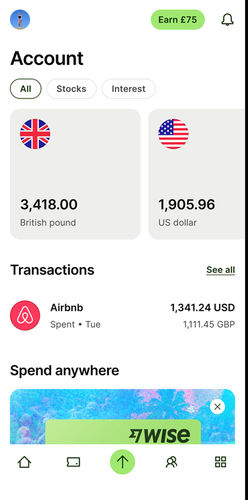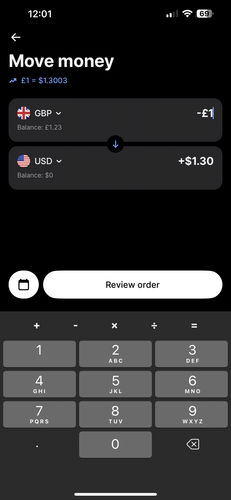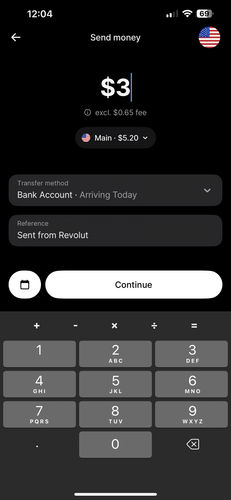Send money to Indonesia
"Over 16 million customers use Wise, mostly for their excellent mobile app, transparent fee structure & use of mid-market rates. Now increasingly used for larger transfers."
"Xe has over 30 years of currency exchange experience, and is one of the most reputable names on the market. 200 countries, 100 currencies, & funds often received in seconds."
"Over 16 million customers use Wise, mostly for their excellent mobile app, transparent fee structure & use of mid-market rates. Now increasingly used for larger transfers."
"Revolut has 50+ million customers globally. You can hold up to 36 currencies in the app and send money quickly in 70+ currencies to 160+ countries."
"24/7 live chat support provided in six languages. Special first transfer rates available, with airtime topup supported to many countries in Africa, Asia and South America."
"OFX have been helping individuals and businesses send money for over 25 years. Transfer in 50+ currencies to 170+ countries, with 24/7 phone access to currency experts."
"Xe has over 30 years of currency exchange experience, and is one of the most reputable names on the market. 200 countries, 100 currencies, & funds often received in seconds."
"Regency's UK-based account management team has vast experience. Get support on all kinds of transfers, from overseas property transactions to business payments & more."
"Remitly focuses on sending money to friends and family in Asia, Africa and South America. Wide coverage and well-suited to regular transfers home."
"Xoom, a PayPal service, allows you to send money in more than 160 countries. You can send cash for over-the-counter pickup or home delivery, as well as send by bank transfer or debit card."
"Securely send money to and from 150+ countries and 20+ currencies. Same-day transfers avaialble on most major currencies."
"Sendwave is trusted by over 1 million users across the US, UK, Canada and EU. 24/7 support is available online and via the app."
"Send money to over 40 destinations online and in the mobile app."
"Paysend has transparent fees and rates, with transfer sent within seconds to your recipient's bank. They also have global 24/7 support for any enquiries, and bank-level security."
"Moneygram is a well established service with over 80 years in the sector. They support over 200 countries worldwide and have over 440,000 retail locations."
Overall best choice: Wise
We tested & reviewed 17 best money transfer providers to Indonesia, and Wise scored the highest.
Wise appeared in 92.3% of IDR searches, and was the best way to send money to Indonesia out of 17 that support Rupiah transfers.
So for a great mix of cost, speed & features, make your Indonesia transfer using Wise via Bank transfer.

How to send money to Indonesia with the best rate
Consider this before sending money to Indonesia
Don't settle for the first option. Always compare ways to send money to Indonesia to find out about fees, speed, and reliability.
Our analysis included 17 providers that operate in Indonesia.
Through this, you get a comprehensive view of all the options you have when sending money to Indonesia.
The cheapest way to send money to Indonesia: Revolut
From the 17 companies tested in the past 6 months, Revolut consistently offers the cheapest money transfer IDR to Indonesia.
Revolut appeared in 82.8% of our searches as the most cost-effective option, being % cheaper than the second cheapest provider.
Revolut charges $0 per transfer to Indonesia and applies a 0.2% markup on the IDR exchange rate.
For the best value, use a Bank transfer deposit to maximize the amount of IDR received.



The fastest way to send money to Indonesia: Wise
Based on a $2,000 transfer and six months of comparison data for IDR transfers, Wise appeared 49 times in our searches as the quickest option for sending IDR to Indonesia.
They charge $9.36 in fees and apply a 0.02% markup on the ‘real’ IDR rate. This is 0% cheaper than the second-best provider.
For the best balance between speed and cost, we suggest using a deposit for Rupiah transfers.

The easiest way to send money to Indonesia: Wise
Wise ranked as the top-rated money transfer provider in 92.3% of searches related to Indonesia based on 6 months of comparison data from MoneyTransfers.com.
They offer transparent fees, charging $21.13 per transfer with 0% markup added to the IDR rate.
Getting started with Wise takes less than 3 minutes, making it a fast, affordable, and user-friendly choice for sending Rupiahs.

Making large money transfers to Indonesia
When sending large amounts of Rupiah to Indonesia, it's important to consider factors like the limits, IDR rates, customer support, as well as legal and government-imposed restrictions in Indonesia.
Wise is our top recommendation for moving large amounts of IDR.
Whether you're purchasing property in Indonesia, need to pay tuition fees, have a wedding there, or transfer money for business in Indonesia, Wise will ensure a smooth and secure transaction.
Of all the companies we’ve tested and reviewed that specialize in large IDR transfers, Wise consistently ranked as the top-rated choice.
They charge $21.13 per transfer and apply 0% markup on top of the IDR exchange rate, making them perfect for moving big amounts.

Understand the costs of money transfers to Indonesia
The total cost of IDR transfers depends on your location, the amount of IDR sent, the delivery/deposit methods, transfer fees, and the markup applied to the IDR exchange rate.
Transfer fee
The money transfer service you use to send Rupiah can apply a fixed fee, a percentage-based fee, or a combination of both.
For example, a $2,000 transfer to Indonesia will cost you $0 in fees with Remitly, based on our May 2025 analysis of 17 services supporting Rupiah transfers.
IDR exchange rate markup
An exchange rate markup is the percentage added to the mid-market IDR rate.
Using the same example, Wise offers the best IDR exchange rates, with a 0% markup on the USD- IDR rate. This means for every USD sent, you receive 16,672.7 IDR with 0% deducted from it.
Deposit method
How you fund your transfer can significantly impact the overall cost.
Bank transfer is the most common option, costing up to $11.5 per transfer to Indonesia.
Debit card transfers can go as high as $7,396.73 in fees, while credit cards can reach $0 per IDR transfer and may include additional cash advance fees and other fees.
Bank transfer is the cheapest payment method for sending IDR.

How to find the best exchange rate for Rupiah transfers
An exchange rate is a constantly changing value of IDR in relation to another currency. The exchange rate you secure impacts how much IDR you will get, so timing your transfer is essential to get the most out of it.
Let's dive into some recent IDR trends.
Over the past six months, the exchange rate from USD to IDR has seen some fluctuation. On average, it stood at 16,180.9815 Rupiah.
During this period, the highest value recorded for Rupiah was 17,239.75, while the lowest was 0.
Wise, which is our recommended service for sending money online to Indonesia offers an exchange rate that is only 0% above the mid-market rate.
Want to secure the best Rupiah exchange rates?
Sign up for our rate alerts and we'll tell you when it's the best time to move your money to Indonesia!
Top payment methods to use for transfers to Indonesia
Money transfer companies will offer different ways to fund your transfer to Indonesia. Depending on the service used, deposit options can affect the speed, the cost of your transfer, and the amount of IDR received.
How we analyze the market
We track the cost, speed, and product offerings of the leading money transfer services available in Indonesia.
Our comparison engine and algorithms evaluate providers based on over 25 factors, including transfer fees, ease of use, exchange rates, mobile apps, transfer times & customer support.
We also consider how these services are rated on platforms like TrustPilot, AppStore, and Google Play, giving you a comprehensive view of what to expect.
This thorough analysis helps you get the best available deal - every time you want to move money to Indonesia.
We also provide unbiased and detailed reviews of all the top money transfer companies. You can use these reviews to find the best service for your needs when sending money to Indonesia
For a deeper understanding of our commitment to integrity and transparency, we invite you to read our editorial policy document.

Related transfer routes
Send money from Indonesia
Send money to Indonesia
Keep your money safe
Making sure your funds are safe when transferring to Indonesia is really important. Ensure you send money to the recipients in Indonesia you know and trust.
Always choose providers that are regulated by financial authorities.
If you don’t know what the key regulatory bodies are in Indonesia, please refer to our directory of financial regulators worldwide.
FAQs
Find answers to the most common questions on our dedicated FAQ page.



.svg)









.svg)





















